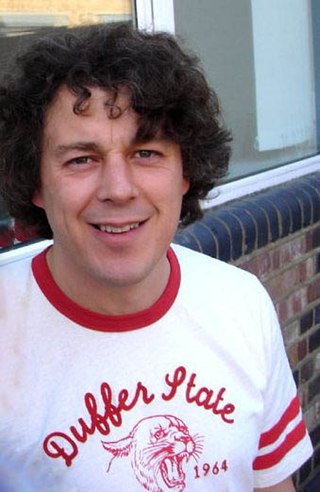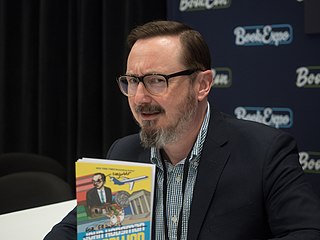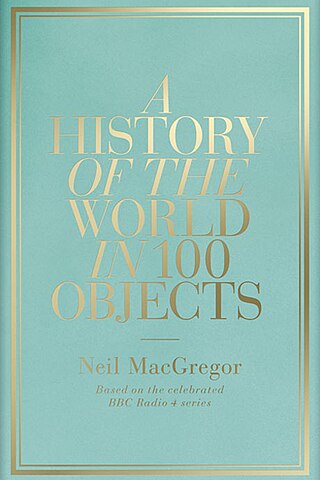
James Burke is a British broadcaster, science historian, author, and television producer. He was one of the main presenters of the BBC1 science series Tomorrow's World from 1965 to 1971 and created and presented the television series Connections (1978), and its more philosophical sequel The Day the Universe Changed (1985), about the history of science and technology. The Washington Post has called him "one of the most intriguing minds in the Western world".

Griffith Rhys Jones, often known and credited as Griff Rhys Jones, is a Welsh comedian, writer, actor, and television presenter. Rhys Jones starred in a number of television series with his comedy partner, Mel Smith. He and Smith came to national attention in the 1980s for their work in the BBC television comedy sketch shows Not the Nine O'Clock News and Alas Smith and Jones.

Alan Roger Davies is an English stand-up comedian, writer, actor and TV presenter. He is best known for his portrayal of the title role in the BBC mystery drama series Jonathan Creek (1997–2016) and as the only permanent panellist on the BBC panel show QI since its premiere in 2003, outlasting its original host Stephen Fry.

The Now Show is a British radio comedy broadcast on BBC Radio 4, which satirises the week's news. The show is a mixture of stand-up, sketches and songs hosted by Steve Punt and Hugh Dennis. The show used to feature regular appearances by Jon Holmes, Laura Shavin, a monologue by Marcus Brigstocke, and music by Mitch Benn, Pippa Evans or Adam Kay, but now features a much wider range of contributors.

A podcast is a program made available in digital format for download over the Internet. For example, an episodic series of digital audio files that a user can download to a personal device to listen to at a time of their choosing. Podcasts are primarily an audio medium, with some programs offering a supplemental video component. Streaming applications and podcasting services provide a convenient and integrated way to manage a personal consumption queue across many podcast sources and playback devices. There are also podcast search engines, which help users find and share podcast episodes.

Digital Planet was a radio programme broadcast on the BBC World Service presented by Gareth Mitchell. Alternating as contributors are Bill Thompson, Ghislaine Boddington and Angelica Mari, who comment on items in the programme and discuss them with Mitchell. The show, broadcast weekly, covered technology stories and news from around the world.

Karl Pilkington is an English presenter, comedian, actor, voice-artist, producer and author.

Timothy Douglas Harford is an English economic journalist who lives in Oxford.
From Our Own Correspondent is a weekly BBC radio programme in which BBC foreign correspondents deliver a sequence of short talks reflecting on current events and topical themes in the countries outside the UK in which they are based. The programme offers the BBC's correspondents around the world a chance to give a personal account of events from the epoch-making to the inconsequential.

John Kellogg Hodgman is an American author, actor, and humorist. In addition to his published written works, such as The Areas of My Expertise, More Information Than You Require, and That Is All, he is known for his personification of a PC in contrast to Justin Long's personification of a Mac in Apple's "Get a Mac" advertising campaign, and for his work as a contributor on Comedy Central's The Daily Show with Jon Stewart.

What the Industrial Revolution Did for Us is a BBC documentary series produced in conjunction with the Open University that examines the impact of the Industrial Revolution on modern society. It was originally broadcast on BBC Two from 7 October to 11 November 2003.
More or Less is an investigative BBC Radio 4 programme about the accuracy of numbers and statistics in the public domain. The programme often addresses statistical issues which pertain to topics in the news.

A History of the World in 100 Objects was a joint project of BBC Radio 4 and the British Museum, consisting of a 100-part radio series written and presented by British Museum director Neil MacGregor. In 15-minute presentations broadcast on weekdays on Radio 4, MacGregor used objects of ancient art, industry, technology and arms, all of which are in the British Museum's collections, as an introduction to parts of human history. The series, four years in planning, began on 18 January 2010 and was broadcast over 20 weeks. A book to accompany the series, A History of the World in 100 Objects by Neil MacGregor, was published by Allen Lane on 28 October 2010. The entire series is also available for download along with an audio version of the book for purchase. The British Museum won the 2011 Art Fund Prize for its role in hosting the project.

Eddie Kadi is a British-Congolese comedian, presenter and actor.

Kermode and Mayo's Film Review was a radio programme with Mark Kermode and Simon Mayo, broadcast on BBC Radio 5 Live on Friday afternoons. The show was self-described as the BBC's "flagship film programme" and featured film reviews from Kermode, interviews with actors and other guests, and listeners' emails. The programme's Twitter handle, "Wittertainment", was a nickname for the programme itself.

No Such Thing as a Fish is a weekly British podcast series produced and presented by the researchers behind the BBC Two panel game QI. In the podcast each of the researchers, collectively known as "The QI Elves", present their favourite fact that they have come across that week. The most regular presenters of the podcast are James Harkin, Andrew Hunter Murray, Anna Ptaszynski and Dan Schreiber, and there are occasional guest presenters. When one of the regular presenters is unavailable for any reason, fellow QI elves Alex Bell and Anne Miller often take their place.

Hannah Fry is a British mathematician, author, and radio and television presenter. She is Professor in the Mathematics of Cities at the UCL Centre for Advanced Spatial Analysis. She studies the patterns of human behaviour, such as interpersonal relationships and dating, and how mathematics can apply to them. Fry delivered the 2019 Royal Institution Christmas Lectures.

My Dad Wrote a Porno was a British comedy podcast hosted by Jamie Morton, James Cooper, and Alice Levine. Published from 4 October 2015 to 12 December 2022, each episode of the podcast featured Morton reading a new chapter of Belinda Blinked, an amateur erotic novel series written by his father under the pen name Rocky Flintstone. Morton, Cooper, and Levine react to the material and provide running commentary. Each episode featured Cooper and Levine hearing the chapter for the first time, whereas Morton had read the chapter beforehand to prepare.

The Elis James and John Robins show is a weekly radio show presented by British comedians Elis James and John Robins. Formerly broadcast on commercial radio station Radio X, the show now airs on BBC Radio 5 Live on Friday afternoons from 2:00pm–4:00pm. Highlights from the show are released as a weekly podcast. Robins has described the show as "a commercial indie radio show that has got wildly out of hand".
Greg Jenner is a British author and public historian with a particular interest in communicating history through pop culture and humour.
















